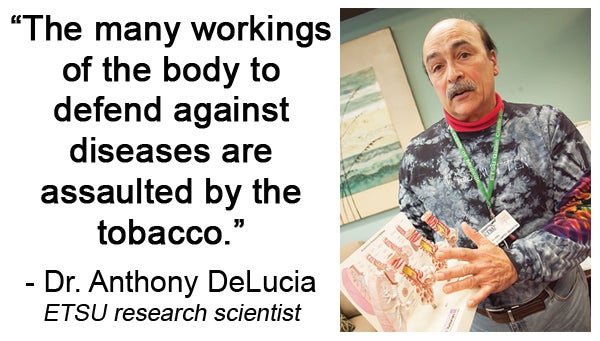Researcher says smoking attacks the whole body
Published 9:41 am Wednesday, November 26, 2014
Smoking affects the human body in a number of ways, but they are all an assault on the body’s normal workings, according to one local research scientist.
Dr. Anthony DeLucia is a lung health advocate and research scientist at East Tennessee State University’s James H. Quillen College of Medicine. He is also a former chairman of the American Lung Association and he has been active with the association at the national level for many years.
“The many workings of the body to defend against diseases are assaulted by the tobacco,” DeLucia said.
For years, people have associated the dangers of tobacco with lung diseases, DeLucia said.
“The lungs are the entry point, so that is why one of the focal points over the years has been on lung disease and lung cancer,” he said. The secondary focus has been on cardiovascular issues.
However, DeLucia said, the dangers of tobacco aren’t limited to the lungs and heart. “Tobacco is able to cause a lot of harm systemwide,” he said.
Two of the major concerns with tobacco use and its effects on the body, DeLucia said, are inflammation and immunity. “That is where the body really gets into trouble,” he said.
Inflammation creates an imbalance in the body systems, DeLucia said, which can affect how a person’s organs function. The imbalance in the system can lead to problems with the body’s natural ability to fight off diseases and infections.
DeLucia specializes in chronic respiratory diseases such as emphysema and chronic obstructive pulmonary disease, two diseases often associated with smoking.
The lungs are “extremely delicate” organs, DeLucia said, and when they are damaged, the rest of the body suffers.
“They are so fragile, but they do such a fantastic job, that is why we have to protect them,” he said. “In the ALA, we had a slogan, ‘If you can’t breathe, nothing else matters.’ ”
With the advancement of modern medicine, people are living longer. As a result, DeLucia said, many people are living with chronic illness, and in some cases more than one.
“Now we think in terms of multimorbidities,” he said, explaining “multimorbidity” is the term for when one person suffers from two or more chronic illnesses. “Smoking may be the genesis of many of them at the same time.”
Many other things also can impact how smoking affects the body, DeLucia said, including a person’s genetics, his or her diet and environmental factors such as air quality.
Because so many factors contribute to disease, DeLucia said there is no “magic number” for how much or how long a person can smoke before they suffer serious effects.
“So many of our health behaviors have to be managed. The most important lifestyle risk we have is smoking,” Delucia said. “Ask yourself, is it worth it? I look at health as something not to squander.”
When asked what advice he would give to someone considering quitting smoking,
DeLucia said he would recommend they find a support group and seek the support of their friends and family.
“It would be one of the best things you could ever do, even if you fail,” he said. “Rome wasn’t built in a day. It will probably take you several tries to quit. You will thank your self over and over again.”
An ETSU faculty member since 1977, DeLucia is a professor in the department of surgery at the College of Medicine and has been recognized both regionally and nationally for his advocacy and research on air pollution as well as tobacco use prevention and cessation.
DeLucia has been involved in the a number of community-based health promotion programs in the region including the Carter County Health Council and smoking cessation programs.
He has also worked with the Southern Tobacco Communities Project and the Campaign for a Healthy and Responsible Tennessee.





